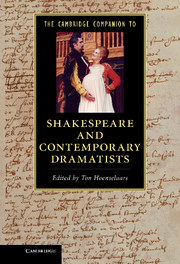Book contents
- Frontmatter
- Contents
- Illustrations
- Contributors
- Preface
- Chronology of the life and work of Shakespeare and contemporary dramatists
- 1 John Lyly and the University Wits
- 2 Thomas Kyd and the Elizabethan blockbuster
- 3 ‘The words of Mercury’
- 4 The dyer’s hand
- 5 Urbane John Marston
- 6 Thomas Dekker and the emergence of city comedy
- 7 Shakespeare
- 8 Thomas Heywood
- 9 George Chapman’s learned drama
- 10 Francis Beaumont and John Fletcher’s tragicomedy as musical melodrama
- 11 Thomas Middleton and the early modern theatre
- 12 John Webster
- 13 John Ford
- 14 Philip Massinger
- 15 Richard Brome and the idea of a Caroline theatre
- 16 Troublesome histories
- Select bibliography
- Index
- References
15 - Richard Brome and the idea of a Caroline theatre
Published online by Cambridge University Press: 05 December 2012
- Frontmatter
- Contents
- Illustrations
- Contributors
- Preface
- Chronology of the life and work of Shakespeare and contemporary dramatists
- 1 John Lyly and the University Wits
- 2 Thomas Kyd and the Elizabethan blockbuster
- 3 ‘The words of Mercury’
- 4 The dyer’s hand
- 5 Urbane John Marston
- 6 Thomas Dekker and the emergence of city comedy
- 7 Shakespeare
- 8 Thomas Heywood
- 9 George Chapman’s learned drama
- 10 Francis Beaumont and John Fletcher’s tragicomedy as musical melodrama
- 11 Thomas Middleton and the early modern theatre
- 12 John Webster
- 13 John Ford
- 14 Philip Massinger
- 15 Richard Brome and the idea of a Caroline theatre
- 16 Troublesome histories
- Select bibliography
- Index
- References
Summary
At the centre of The Antipodes, now his best-known play, Richard Brome (c. 1590–1653) stages an elaborate parade of London city types – lawyers, courtiers, statesmen – who present themselves and their preoccupations to one of the play’s central figures, Peregrine Joyless. One set of professionals is of particular interest to Peregrine: watermen and carmen, labourers whose courtesy and decorum stand in striking contrast to the unruly, brusque behaviour of the courtiers and gentry. As one of them announces to Peregrine, he is ‘humble, yet ambitious / In my devoir to do you best of service’.
Ambitious to be humble – such an ostensibly oxymoronic disposition aptly describes our playwright, who took special care to style himself as eagerly unassuming and deferential. In a commendatory epistle to Beaumont and Fletcher’s Comedies and Tragedies (1647), for instance, Brome asks to ‘retain still [his] wonted modesty’ amidst the other poets, the ‘large train of Fletchers friends’ for whom he wants only to serve as a ‘Follower’.
- Type
- Chapter
- Information
- Publisher: Cambridge University PressPrint publication year: 2012

